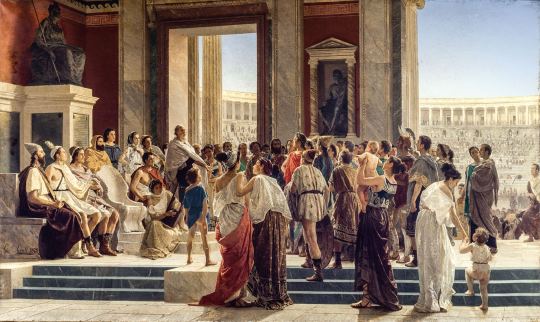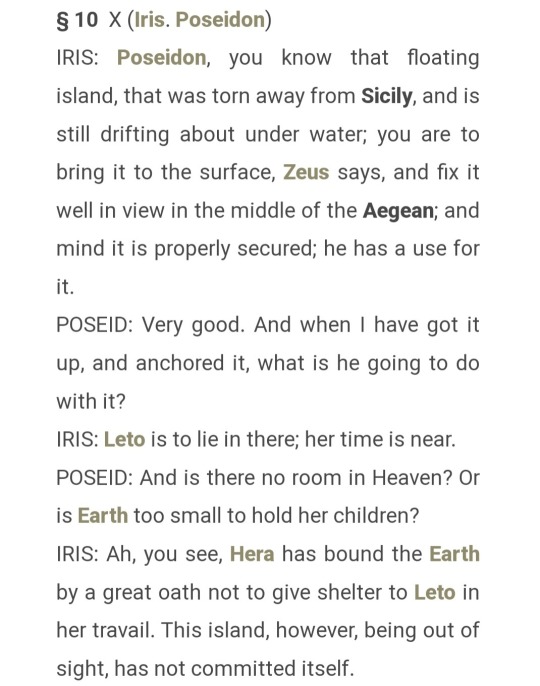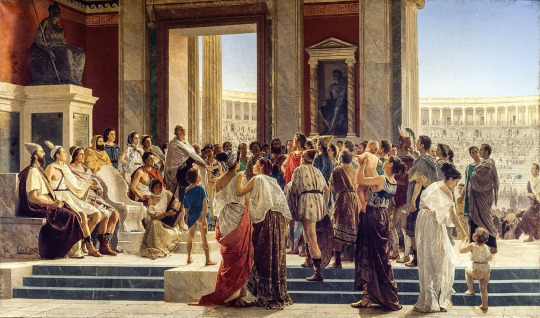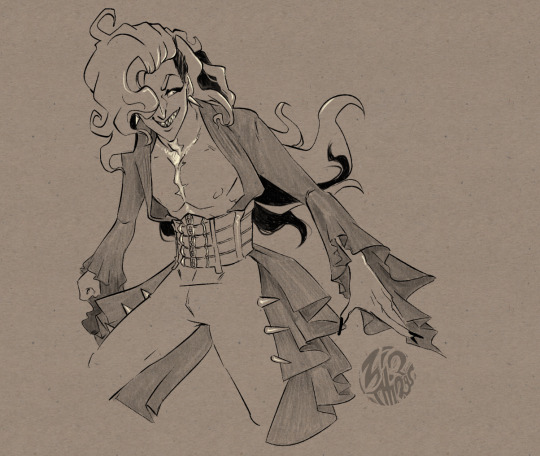#Pindarize
Explore tagged Tumblr posts
Text


PinBoom my beloved
86 notes
·
View notes
Text
omg OKAY SO UHHHH I KNOW THIS IS A TWST BLOG BUT I NEED EVERYONE TO SEE THIS RIGHT NOW‼️‼️🗣️🗣️🗣️
THE FACT THIS GUY FROM DISLYTE LOOKS EXACTLY LIKE HOW I IMAGINE IDIA SHROUD!!!!!
LITERALLY EVERYTHING ABOUT HIM: THE FACE STRUCTURE, THE SKIN, THE HAIR COLOR, THE EYES, (maybe) THE CLOTHES..... GRRRR IM IN LOVE WITH THIS DESIGN BRO





#the character is Pindar from dislyte btw!#ALSO WTF THIS DESIGN IS PEAK#BARK BARK BARK#shroudbud#general post
59 notes
·
View notes
Text
"You [Apollo] who know the appointed end of all things, and all the paths that lead to them? And how many leaves the earth puts forth in spring, and how many grains of sand in the sea and in rivers are dashed by the waves and the gusting winds; and that which will be, and from where it will come, all this you clearly see."
- Pindar, Pythian Ode 9
199 notes
·
View notes
Text

Pindar Exalts a Victor in the Olympic Games by Giuseppe Sciuti
#giuseppe sciuti#art#pindar#olympic games#olympics#ancient greek#ancient greece#classical antiquity#history#europe#european#athlete#athletes#panhellenic games#ancient olympic games#syracuse#laurel wreath#olympic laurel#victory odes
69 notes
·
View notes
Text


Oh i love him....
45 notes
·
View notes
Text

THE NEW SHIMMER IS SO PRETTY WTF
#dislyte#dislyte maria#oh I need her#HER HAIRRR /VPOS#why does she have to be a shimmer instead of Pindar’s ugly ass
40 notes
·
View notes
Note
As usual I read your tags always and so you said Apollo did not ask for resurrection of Asclepius and Hyacinthus so i just wanted to share this. About Asclepius death I read it on theoi.com, that earlier authors don't make him resurrect as a god but that's a later development mentioned only by Roman authors like Cicero, Hyginus and Ovid. But still Apollo has a role in Ovid's version
Ovid, Fasti 6. 735 ff (trans.Boyle) (Roman poetry C1st B.C. to C1st A.D.) : Clymenus [Haides] and Clotho resent the threads of life respun and death's royal rights diminished. Jove [Zeus] feared the precedent and aimed his thunderbolt at the man who employed excessive art. Phoebus [Apollon], you whined. He is a god; smile at your father, who, for your sake, undoes his prohibitions [i.e. when he obtains immortality for Asklepios].
So here it is actually because of Apollo the decision was taken to resurrect him as god. And with Hyacinthus, I don't think I've read about Artemis playing the primary role. I know in Sparta there was a picture of Artemis, Athena and Aphrodite carrying Hyacinthus and his sister to heaven.
This is not on theoi.com but I saw on Tumblr it's from Dionysiaca by Nonnus
Second, my lord Oiagros wove a winding lay, as the father of Orpheus who has the Muse his boon companion. Only a couple of verses he sang, a ditty of Phoibos, clearspoken in few words after some Amyclaian style: Apollo brought to life again his longhaired Hyacinthos: Staphylos will be made to live for aye by Dionysos.
So since he is singing inspired by amyclean stories it probably means in that place it was believed Apollo was the one to bring back his lover to life.
Apollo as god of order was very important so i think it shows how special these people (and admetus too) were to him that he decided to go against the order for them 🥺
ANON!! Shakes you like a bottle of ramune!! BELOVED ANON!!!!! I'm littering your face with kisses, I'm anointing you with olive oil and honey - you absolutely made my night with this because, not only did I get the pure serotonin shot of having someone interact with my tags (yippee, wahoo!!) I also got to have that wonderful feeling of "oh wow, have I misunderstood something that was integral to my understanding of this myth/figure this whole time or is this a case of interpretational differences?" which is imo vital for my aims and interests as someone who enjoys mythological content and literature.
I'll preface my response with this: Hyacinthus is by far the hardest of these to get accounts for because his revival itself, as you very astutely point out, is generally accounted for in painting/ritual format which muddies the waters on who interceded for what. I wasn't actually familiar with that passage from the Argonautica - and certainly didn't remember it so thank you very much for bringing it to my attention!
That said, what I've come to understand, both about Hyacinthus and about Asclepius is that in the accounts of their deaths, Apollo's position is startlingly clear.
For Hyacinthus, it is established time and again that Apollo would have sacrificed everything for him - his status, his power, his very own immortality and divinity. Ovid writes that Apollo would have installed him as a god if only he had the time:

(Ovid. Metamorphoses. Book X. trans. Johnston)
Many other writers too speak of how Apollo abandoned his lyre and his seat at Delphi to spend his days with Hyacinthus, but they also all agree that when it came to his death - he was powerless. Ovid gives that graphic account of Apollo's desperation as he tries all his healing arts to save him to no avail:

(Ovid, Metamorphoses Book X. Apollo me boy, methinks him dead. trans Johnston)
Bion, in one of his fragments, writes that Apollo was "dumb" upon seeing Hyacinthus' agony:

(Bion, The Bucolic Poets. Fragment XI. trans Edmonds)
Even Nonnus in the Dionysiaca speaks constantly of Apollo's helplessness in the face of Hyacinthus' fate where he writes that the god still shivers if a westward wind blows upon an iris:
and when Zephyros breathed through the flowery garden, Apollo turned a quick eye upon his young darling, his yearning never satisfied; if he saw the plant beaten by the breezes, he remembered the quoit, and trembled for fear the wind, so jealous once about the boy, might hate him even in a leaf...
(Nonnus, Dionysiaca, Book 3. trans Rouse)
And the point here is just that - Apollo, at least as far as I've read, cannot avert someone's death. He simply can't. Once they're already dead - once Fate has cut their string - all Apollo's power is gone and he can do nothing no matter how much he wants to. And this is, as far as I know, supported with the accounts of Asclepius as well!
Since you specifically brought up Ovid's account, I'll also stick only to Ovid's account but in Metamorphoses when we get Ovid's version of Coronis' demise, he writes that Apollo intensely and immediately regrets slaughtering Coronis. He regrets it so intensely that he, like he does with Hyacinthus, does his best to resuscitate her:

(Ovid, Metamorphoses Book Two. Apollo's regret)
And like Hyacinthus, when it becomes clear that what has happened cannot be undone, Apollo wails:

(Ovid, Metamorphoses Book Two. Apollo wept.)
Unlike his mother, Asclepius in her womb had not yet died and so, with the last of Apollo's strength, he does manage, at least, to save him.

(Ovid, Metamorphoses Book Two. Apollo puts the 'tearing out' in Asclepius.)
But it goes further than even that because Ocyrhoe, Chiron's daughter, a prophetess who unduly gained the ability to directly proclaim the secrets of the Fates, upon seeing the baby Asclepius, immediately prophesies his glory, his inevitable death and then his fated ascension:

(Ovid. Metamorphoses, Book Two. Ocyrhoe's prophecy. trans Johnston)
Before she too succumbs to her hubris and is transformed by the Fates into a horse so she can no longer speak secrets that aren't hers to share.
These things ultimately are important because it establishes two very important things: 1) Apollo can't do anything in the face of the ultimate Fate of mortals, which is, of course, death and 2) even when Apollo is Actively Devastated, regretful, yearning, mournful, guilty or some unholy combination of all of the above, when someone is dead, he accepts that they are gone. Even if he is devastated by it, even if he'll cry all the rest of his days about it - if they're dead? Apollo lets them go. In Fasti, when Zeus brings Asclepius back, he does not say Apollo asked him to - Zeus, or well, in this case Jove, brings Asclepius back because he wants Apollo to stop being mad at him.

(Ovid, Fasti VI. Apollo please come home your father misses you. trans. A.S Kline)
Even Boyle's translation which you used above in your findings hints that Zeus made Asclepius a god because he wanted Apollo to stop grieving. (i.e 'smile at your father', 'for your sake [he] undoes his prohibitions')
And like, Apollo was deeply upset by Asclepius' death - apart from killing the Cyclops in anger, in book 4 of the Argonautica, Apollonius writes that the Celts believe the stream of Eridanus to be the tears Apollo shed over the death of Asclepius when he left for Hyperborea after being chastised by Zeus for killing his Cyclops:
But the Celts have attached this story to them, that these are the tears of Leto's son, Apollo, that are borne along by the eddies, the countless tears that he shed aforetime when he came to the sacred race of the Hyperboreans and left shining heaven at the chiding of his father, being in wrath concerning his son whom divine Coronis bare in bright Lacereia at the mouth of Amyrus.
It all paints a very clear picture to me. Apollo did not ask for either of them to be brought back. Though bringing them back certainly pleased and delighted him, they are actions of other gods who are moved by Apollo's grief and mourning and seek to mollify him. Him not asking doesn't mean he didn't want them back which I think is a very important distinction by the by, but it simply means that Apollo knows the natural order of things and, even if it hurts, he isn't going to press his luck about it.
Which, of course, brings us to Admetus. And I'm really not going to overcomplicate this, Admetus is different because, very vitally, Admetus is not dead. Apollo can't do a thing once Fate has been carried out and Death has claimed a mortal but you know what he absolutely can do? Bargain like hell with the Fates before that point of inevitability. And that's what he does, ultimately for Admetus and Alcestis. He sought to prolong Admetus' life, not revive him from death or absolve him from death altogether and even after getting the Fates drunk, he's still only able to organise a sacrifice - a life for a life - something completely contingent on whether some other mortal would be willing to die in Admetus' place and not at all controllable by Apollo's own power.
All of these things, I think come back to that point you made - that Apollo's place as a god of order is very important and therefore these people are very special to him if it means he's willing to go against that order but, I also wish to challenge that opinion if you'd let me. Apollo's place as a god of order is very important and therefore, I would argue, that it is even more important that it is shown that he does not break the divine order, especially for the people that mean the most to him. The original context of my comments which started this conversation were on this lovely, lovely post by @hyacinthusmemorial which contemplated upon Asclepius from the perspective of an Emergency Medical personnel and included, in their tags, the very poignant lines "there's something about Apollo letting go when Asclepius couldn't that eats my heart away" and "you do what you can, you do your best, but you don't ever reach too far" and I think that's perfectly embodied with the Apollo-Asclepius dichotomy. Apollo grieves. He wails, he cries, he does his best each and every time to save that which is precious to him but he does not curse their nature, he does not resent that they are human and ultimately, he accepts that that which is mortal must inevitably die. There is nothing that so saliently proves that those who uphold rules are also their most staunch followers - if Apollo wants to delight in his place as Fate's mouthpiece, he cannot undo Fate. And, if even the god of healing and order himself cannot undo death, what right does Asclepius, mortal as he is, talented as he is, have to disrespect it?
The beauty of these stories isn't that Apollo loved them enough to bring them back. The beauty is that Apollo loved them enough to let them go.
#this is such a long ass post oh my god#ginger answers asks#This totally got away from me but I AM PASSIONATE ABOUT THIS AAAA#Anon beloved anon I hope you don't take this as me shutting you down or anything because that really isn't what I'm trying to do#I'm definitely going to dig more into the exactness of 'who petitioned for Hyacinthus to be revived actually?"#I always stuck to the belief that it was Artemis because of the depictions of his revival + his procession is usually devoid of Apollo#I know some renaissance paintings have him and Apollo reuniting but that's usually In The Heavens y'know#I genuinely couldn't think of any accounts that have Apollo Asking for anyone to be revived#Apollo does intercede sometimes but that's usually for immortals like Prometheus#Or even when he's left to preside over Zagreus' revival and repair in orphic tradition#Concerning Asclepius there's like a ton to talk about tbh#There's the fact that in some writings (in quite a lot actually) the reason Asclepius was killed wasn't necessarily that he brought someone#back - it was that he accepted money for it#Pindar wrote about it and Plato talks about how if Asclepius really did accept gold for a miracle then he was never a son of Apollo#It's a whole thing really#I think it's very important that it's Asclepius in his mortal folly that tests the boundaries of life and death tbh#The romanticisation of going to any length to bring back a loved one is nice and all#But sometimes the kindest and most lovely thing you can do for someone is to accept it#Just accept that they're gone - accept that there was nothing that could be done and even if the grief is heavy - keep living#Maybe we won't all get our lost loves back#But there are definitely always more people worth loving if you just live long enough to find them#apollo#asclepius#zeus#admetus#greek mythology#ovid#oh my god so much ovid#hyacinthus#coronis
130 notes
·
View notes
Text


eccentric shadow decree man who beats up your camera. i guess i have two nickels now
#madison speaks#dislyte#pindar (orpheus)#dislyte pindar#toland (tezcatlipoca)#dislyte toland#my top three espers was so solid for so long and then pindar drops by. i have me weaknesses and he is all of them#*my I’m not retyping all of that
39 notes
·
View notes
Text
I like the versions where Zeus gets more involved in helping Leto during the labor. And here it seems like he's making some arrangements before Leto even goes into labor:


Lucian, Dialogues Of The Sea-gods (trans. Henry Watson Fowler)
Poseidon going "why should I bring this island up, is the earth too small for her kids?" akdjsjs stop your sass Earthshaker. But it's sweet that he is so willing to help Leto, and even seems excited for the birth of the twins (and he called Artemis and Apollo the fairest of the gods <3)
#Poseidon#Iris#Zeus#Leto#even in Pindar's version Zeus is more involved#and in Callimachus' hymn he somehow managed to take away Hera's anger towards Apollo#he could have done more as the king of the gods#but he did whatever he could without rattling the queen of the gods too much#apollo info#father dearest
77 notes
·
View notes
Text

Hit me, baby, one more time
143 notes
·
View notes
Text

Giuseppe Sciuti (Italian, 1834-1911) Pindar Recognises a Victor in the Olympic Games, 1872
#Giuseppe Sciuti#italian art#italian#italy#Pindar Recognises a Victor in the Olympic Games#1872#1800s#art#fine art#european art#classical art#europe#european#fine arts#oil painting#europa#mediterranean#roman empire#rome#southern europe#cradle of civilization
48 notes
·
View notes
Text
"It is Apollo who dispenses remedies to men and women for grievous diseases, and who bestowed on us the cithara, and gives the Muses' inspiration to whomever he will, bringing peaceful concord into the mind, and who possesses the oracular shrine."
- Pindar, Pythian Ode 5
160 notes
·
View notes
Text

"but I pray to mnamosyna, the fair-robed child of ouranos, and to her daughters [the mousai], to grant me ready resource; for the minds of men are blind, whosoever, without the maids of helikon, seeketh the steep path of them that walked it by their wisdom." pindar, paean 7

(image source)

#helpol#hellenic polytheism#hellenic polytheist#hellenic worship#hermits-religion-reblogs#hermits-notes#mnemosyne#pindar#greek religion
20 notes
·
View notes
Text
Generally when Zeus plays a role in the birth of his children by Leto it is a minor or indirect one (E.G. he calms Hera down after Apollo is born in Kallimachos' Hymn to Delos or orders someone to assist Leto as in Hyginus Fabulae and Lucian's Dialogues of the Sea Gods), but Pindar gives us an account where he personally supervises the birth itself, which is unusual and really interesting:
„And there often comes from Naxos . . . for the sacrifice of sleekly reared sheep in the company of the Graces to the Cynthian cliff, where they say that black-clouded, bright-thundering Zeus sat above the heights and guarded with providence, when the mild-minded daughter of Coeus was released from her sweet birth-pang. When the twins shone like the sun, moving towards the bright light, Eileithuia and Lachesis emitted a great noise from their mouths.”
41 notes
·
View notes
Text
When toils have been resolved, festivity is the best physician; Songs, the skillful daughters of the Muses, soothe with their touch Words of praise married to the music of the lyre Will comfort more than the hot spring. Words live longer than deeds When, by the Graces' assent, They rise up out of the deep heart.
Pindar
35 notes
·
View notes
